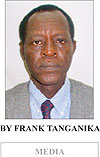No one who followed the 8th National Dialogue on radio, Rwanda Television and other mass communication channels could have failed to notice the keen interest in sustainable development from Rwandans of all walks of life.


No one who followed the 8th National Dialogue on radio, Rwanda Television and other mass communication channels could have failed to notice the keen interest in sustainable development from Rwandans of all walks of life.
The two day dialogue, which was presided over by President Paul Kagame, covered a wide range of national issues, from Health to Education, Agriculture to Investment, Diplomacy to Local Administration, Export Promotion to Mining etc, but what struck me most was the manner in which the debates were conducted.
In addition to the thousands of participants, who included members of the Diaspora from as Iceland, there was massive interaction from the public through phone-ins, SMS and emails.
Rwandans were treated to free and open debates bringing to the fore major issues of development but, in this column, I will dwell on governance, especially fighting corruption.
The Mayor of Nyabihu presented strategies adopted by his district council to fight corruption. It is worth noting that corruption is a major obstacle to development in many African countries, although it is not a preserve of the continent.
In the last one year the media has reported about politicians and top business persons losing their jobs or imprisoned for corruption. It is a human vice that has to be continually fought.
In her book "The Caged Virgin” the Somalia born woman, Ayaan Hirsi Ali who once served as a Netherlands parliamentarian wrote that in countries where the corruption is endemic "only a section of the population has access to public services through clan or tribe, and these people take advantage of the endemic corruption within the civil service and the business community”.
This observation, though based on the writer’s experience of another part of Africa is relevant to pre-1994 Rwanda where sons and daughters of the elite group were preferentially considered for admissions to secondary schools and higher institutions of learning, as well as in public service employment. Unlike today where admission of students to public academic institutions is based on the student’s academic performance, a son of burgomaster was assured a place in a school of his choice no matter his grades. How can we involve the masses in the fight against such practices?
Let us turn to Nyabihu district for the lessons on how to deal with the vice. The mayor reported strategies that involved people in the process of reducing corruption; A toll free telephone line was availed to district residents who are encouraged to call the mayor’s office to report corruption and other cases that hampered service delivery to the people. Another strategy is the establishment of a special commission that identified problems in all the sectors of his district and solved the problems on site.
The third and last is a senstization strategy, Ikiganiro Guca Ruswa or public talk show on how to eliminate corruption. This is an effective strategy as it addresses the problem of the knowledge gap that exists in all communities, but is often overlooked. It is easy to assume that all people know what is right or wrong or what we know; a perception that leads officials to misunderstand the people they lead and sometimes brand them rebellious.
It is important to keep educating the people about the dangers of negative practices and misguided ideologies and to involve them in the discussions with a view to finding collective solutions to local problems, like they do in Nyabihu District, for an informed population becomes vigilant if they are assured of support from the top.
That is perhaps why during the National Dialogue participants were able to direct complaints about nepotism and other forms of corruption to particular leaders and institutions in the presence of the President. Kagame’s style of leadership assures citizens of his support when they advance their concerns because of his clear stand on good governance practices. He often provides solutions to problems raised in public in a transparent manner and encourages people to be vigilant and bring their leaders to account.
Traditionally, Rwanda was a strongly hierarchical society where authority was deeply respected and feared. The trend is changing slowly as a result of decentralization policy which entails devolution of authority which has led to wider participation of the masses and more demand for accountability from those in positions of leadership. However, this trend has to be reinforced by initiating programmes that narrow the gap between the leaders and the led.
Sometimes you find a person who has been wronged by a local administrator but is unwilling to report the matter to higher authorities even when they have been arbitrarily arrested or lost property as a result.
When leaders provide a forum like the Nyabihu commission, people will learn not to fear authority, will be aware of their rights and channels for their grievances and very importantly they will be vigilant. Dialogue at all levels should be encouraged.
It does not only provide leaders with crucial information about people’s needs and aspirations, but it also creates an environment where community members participate democratically in their own affairs and eases tensions and misunderstandings.


